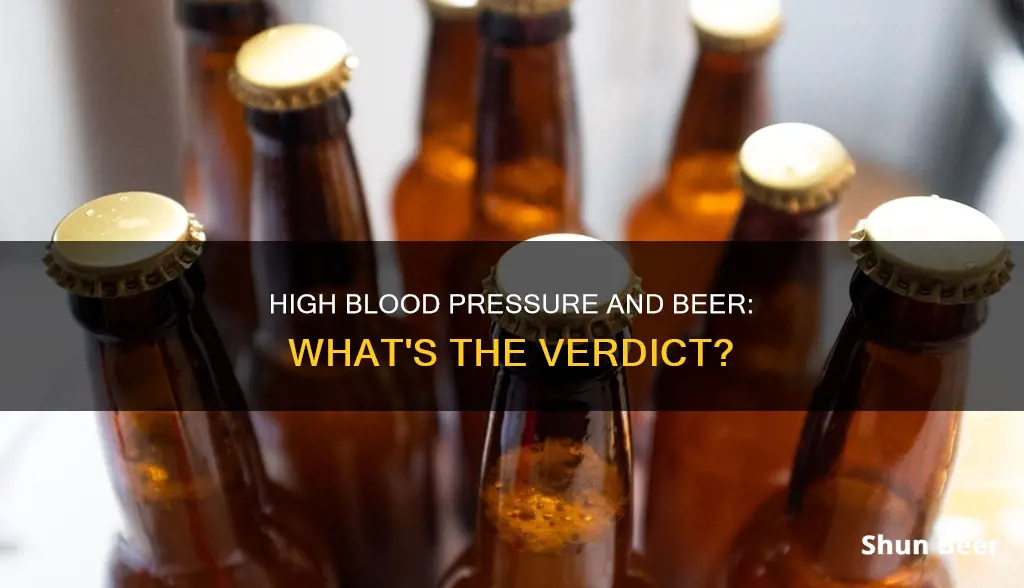
Alcohol can increase your blood pressure. Drinking too much alcohol can raise your blood pressure and cause hypertension. The more alcohol you drink, the higher the risk of developing hypertension. The American Heart Association recommends no more than two drinks per day for men and one drink per day for women.
What You'll Learn

Alcohol and high blood pressure
Alcohol can have both acute and chronic effects on blood pressure. Drinking too much alcohol can raise your blood pressure. If you have high blood pressure, your healthcare professional may ask you to cut back on drinking.
According to the American Heart Association, the recommended alcohol intake for people who choose to drink is no more than two drinks per day for men and one drink per day for women. One drink is defined as 12 ounces of beer, 8 ounces of malt liquor, 5 ounces of wine, or 1.5 ounces of 80-proof liquor.
Drinking a lot of alcohol can affect the muscles in your blood vessels, causing them to become narrower. The more alcohol you drink, the higher the risk of developing hypertension. If you drink regularly, you are at risk, especially if you're over the age of 35. One drink a day can increase the risk.
When your blood vessels are narrower, the heart has to work harder to push blood around your body, which makes your blood pressure go up. High blood pressure can significantly increase your risk of chronic kidney disease, vascular dementia, and strokes.
The more alcoholic drinks you have each day, the higher your systolic blood pressure tends to be. Even people who drink one alcoholic beverage per day showed a link to higher blood pressure compared to non-drinkers.
The type of alcohol doesn't matter, but rather the frequency of your consumption. If you have high blood pressure, it's probably in your best interest to drink minimally.
Beer and NFL: What's the Official Verdict?
You may want to see also

Alcohol's effect on blood pressure
Drinking alcohol can have both acute and chronic effects on blood pressure. Excessive alcohol consumption is considered one of the most common causes of raised blood pressure. Alcohol can affect blood pressure through a variety of mechanisms, including by increasing plasma renin activity, stimulating the sympathetic nervous system, and diminishing baroreceptor sensitivity.
Alcohol's Acute Effects on Blood Pressure
Low-dose alcohol(14 g) within six hours does not affect blood pressure but does increase heart rate. Medium-dose alcohol(14 to 28 g) within six hours decreases systolic and diastolic blood pressure and increases heart rate. High-dose alcohol(30 g) within six hours decreases systolic and diastolic blood pressure and increases heart rate.
Alcohol's Chronic Effects on Blood Pressure
The American Heart Association recommends no more than two drinks per day for men and one drink per day for women for people who choose to drink alcohol. Generally, one drink equals:
- 12-ounce beer (5% alcohol)
- 8-ounce malt liquor (7% alcohol)
- 5-ounce glass of wine (12% alcohol)
- 1.5 ounces of 80-proof liquor
Drinking too much alcohol can raise your blood pressure. If you have high blood pressure, your healthcare professional may ask you to cut back on drinking.
Beer Drinking and Weight Gain: One Day's Impact
You may want to see also

Alcohol's effect on the body
Alcohol can have a significant impact on the body, especially when consumed in large quantities. Here are some of the ways alcohol can affect the body:
- High blood pressure: Drinking too much alcohol can raise your blood pressure. If you have high blood pressure, your healthcare professional may advise you to cut back on drinking. According to the American Heart Association, it is best to limit alcohol consumption to no more than two drinks per day for men and one drink per day for women.
- Increased risk of strokes: Binge drinking and long-term heavy drinking can increase the risk of strokes.
- Cardiomyopathy: Prolonged heavy drinking can cause the heart muscles to weaken, leading to a condition called alcoholic cardiomyopathy.
- Arrhythmias: Alcohol can affect the heart's rhythm, causing it to beat too quickly or irregularly.
- Weight gain: Alcoholic beverages are often high in calories, and excessive drinking can contribute to weight gain.
- Liver damage: Heavy alcohol consumption can lead to liver damage, including conditions such as fatty liver, alcoholic hepatitis, and cirrhosis.
- Impaired judgment: Alcohol can impair judgment and coordination, increasing the risk of accidents and injuries.
- Digestive issues: Alcohol can irritate the digestive system, leading to issues such as stomach pain, nausea, vomiting, and diarrhea.
- Sleep disturbances: Alcohol can disrupt sleep patterns, causing insomnia or non-restorative sleep.
- Nutritional deficiencies: Excessive alcohol intake can interfere with the absorption of essential nutrients, leading to deficiencies.
- Dehydration: Alcohol is a diuretic, which means it increases urine production, leading to dehydration.
- Mental health issues: Alcohol can affect mental health, contributing to depression, anxiety, and increased risk of suicide.
- Dependence and addiction: Alcohol can be highly addictive, and excessive consumption can lead to alcohol use disorder.
It is important to note that the effects of alcohol can vary depending on factors such as age, gender, weight, and individual health status. It is always advisable to consume alcohol in moderation and consult a healthcare professional if you have any concerns.
Drinking Beer on the PGA Tour: What's Allowed?
You may want to see also

How much alcohol can you safely consume if you have high blood pressure?
Drinking alcohol can raise your blood pressure. If you have high blood pressure, your healthcare professional may ask you to cut back on drinking. The American Heart Association recommends no more than two drinks per day for men and one drink per day for women. However, the bottom line is that you can't make a drinking rule that applies to everyone with high blood pressure. It depends on your entire health profile.
According to a review of 32 randomised controlled trials, low-dose alcohol (less than 14 grams) within six hours did not affect blood pressure but did increase heart rate. Medium-dose alcohol (14 to 28 grams) within six hours decreased systolic and diastolic blood pressure and increased heart rate. High-dose alcohol (>30 grams) within six hours decreased systolic and diastolic blood pressure and increased heart rate.
Therefore, if you have high blood pressure, it is best to limit alcohol. If you choose to drink alcohol, the recommended limit is no more than two drinks per day for men and one drink per day for women.
Understanding the Math: 79 Beers Minus 40
You may want to see also

The impact of alcohol on your body
Alcohol can have both acute and chronic effects on blood pressure. Drinking too much alcohol can raise your blood pressure. If you have high blood pressure, your healthcare professional may ask you to cut back on drinking.
The American Heart Association recommends no more than two drinks per day for men and one drink per day for women for people who choose to drink alcohol. Generally, one drink equals:
- 12-ounce beer (5% alcohol)
- 8-ounce malt liquor (7% alcohol)
- 5-ounce glass of wine (12% alcohol)
- 1.5 ounces of 80-proof liquor
Excessive alcohol consumption is considered one of the most common causes of raised blood pressure. Alcohol decreases blood pressure initially (up to 12 hours after ingestion) and increases blood pressure after that. Alcohol consistently increases heart rate at all times within 24 hours of consumption.
Beer after Rum: What's the Best Drinking Order?
You may want to see also







